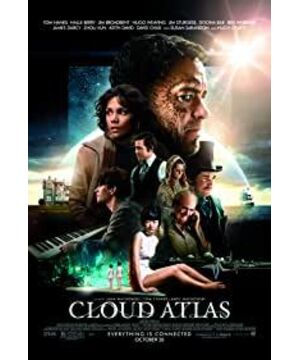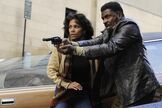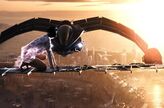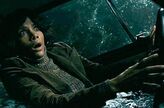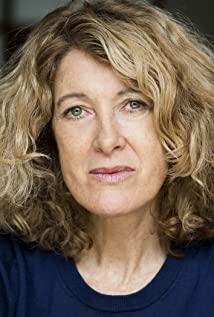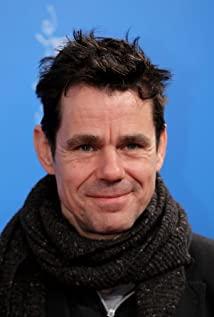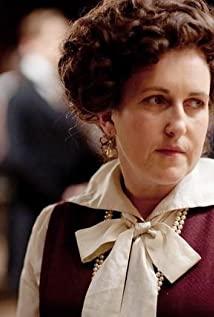To be honest, it’s no easier to write a review for this movie than the writer and director to adapt the original book into a movie (the original book “Cloud Atlas” [David Mitchell] has been called “the most difficult novel to adapt to a movie”).
1. The beautiful structure of cloud map The
film has a total of 6 stories, which are narrated in the order of 12345654321 in the original work. Each story is interrupted by the next story halfway through, and then the second half of each story is written in reverse order. After finishing speaking, there is a kind of architectural symmetry beauty. The film adopts a way of generally following the original sequence and partially disrupting the whole film. The three god-level directors (dirty driver brother...sister and brother, Tom Tykway) have the consciousness to boldly break through the original routine, "destroy" the original architectural beauty, and adopt a relatively free narrative method that is more suitable for film art. The story lines of the whole film are crisscrossed, the montage cut and cut between the clips with deep meaning, the narrative method of broken and whole like "Memento", coupled with the contrasting photography, always lingering in the ears. While concatenating the whole film "Cloud Atlas Sextet"...Although the audience has to keep doing mental work to keep up with the rhythm of the film, they do not feel tired and bored in the beauty of the pictures and music and the expectation of the plot. Movie fun!
Moreover, the 6 stories are interspersed and connected with each other, and they constantly create small surprises. Let's make up for these places by yourself! What impressed me the most was the sentence of the black man on the deck in the story of the Pacific in 1850: "The storm is coming." It heralds the climax of all the stories that follow.
2. The time, place, name, historical background and appreciation of the six
stories
At the end of the 18th century, the European abolition movement flourished, and the triangle, which was even more terrible than Bermuda, was finally rubbed off a little bit.
This is a story full of classicism and legendary drama. The young lawyer Adam Ewing has many character weaknesses: cowardice, indecision, weak will... His father-in-law is a cultural celebrity who believes in not breaking the "laws of nature", and he is involved in the evil business of selling black slaves. Adam is also involved. However, Adam has a kind and fraternal heart. He went to America to sign a slave trade contract with a priest who worshipped his father-in-law, and contracted some kind of illness there, so he found Henry. Dr. Gus - a person who also believes in the natural law of "the weak meat, the strong eat", is also a person who is addicted to wealth. The character of the doctor was revealed in the very beginning of his conversation with Adam: he talked with gusto of cannibalism among primitive tribes, collected a large pile of so-called "weak teeth" that had been eaten, and proudly showed off: "You can Imagine how much a quarter of a pound of teeth is worth?" During dinner, everyone started talking about the so-called "natural order" of Adam's father-in-law, and both the priest and the doctor showed strong ideas of hierarchical oppression, and even made fun of the black housekeeper beside him. . The black housekeeper looked contemptuous, but he could only swallow his breath and say, "I'm very happy here." When it was Adam's turn to speak, Adam made an opinion more like a rebuttal to his father-in-law: "If God created the world, how do we know what we can change and what must stay the same, not to offend?" At the ranch, the black butler She can't hide her deep sympathy and helplessness for her compatriots. Adam, attracted by the strange sound, went to a Maori tribe and met a tortured black Ottowa. The firm eyes of the black man deeply stimulated Adam. On Adam's return journey, Ottowa hid in the cabin and tried to smuggle to his freedom. Adam agreed to help after a psychological struggle. Adam asked Ottowa in the cabin: "I'm a white lawyer, you're a fugitive black slave, why do you want to believe that we can be friends?" Ottowa explained: "One glance is enough." In the bottom of the boat, two people who were calculated by fate help and support each other. The difference is that one is resisting and the other is still unaware. Negro's determined eyes, his determination to pursue freedom, his astonishing dexterity in hoisting, and Adam's timely rescue (again, Adam's cowardly and hesitant character weakness when he stopped the captain from firing) ultimately won his own life. rights, respect and precious freedoms of the crew. On the other hand, the doctor's face full of benevolence and righteousness could not hide the snatch of his eyes when he saw Adam's belongings, Adam's breath was a little weak... Finally ushered in the climax of the story, the storm outside the cabin and inside the cabin broke out, Adam His good deeds were rewarded. The gold coin box, which symbolized slavery and sin, shattered together with the doctor's head in Adam's own hands with thunder and lightning. At the same time, Adam's former character weakness was also shattered. When he rose from the deck, supported by the Negro, to meet the dawn and his homeland, he was also given a new life at the same time. From then on, he began a brave rebellion - against his famous father-in-law, against the so-called "law of nature", against the black slave trade, against the oppression and slavery between people, and became the pioneer of the abolition movement. Fragmentation is very pleasing, and at the same time, Adam's former character weakness is also fragmented. When he rose from the deck, supported by the Negro, to meet the dawn and his homeland, he was also given a new life at the same time. From then on, he began a brave rebellion - against his famous father-in-law, against the so-called "law of nature", against the black slave trade, against the oppression and slavery between people, and became the pioneer of the abolition movement. Fragmentation is very pleasing, and at the same time, Adam's former character weakness is also fragmented. When he rose from the deck, supported by the Negro, to meet the dawn and his homeland, he was also given a new life at the same time. From then on, he began a brave rebellion - against his famous father-in-law, against the so-called "law of nature", against the black slave trade, against the oppression and slavery between people, and became the pioneer of the abolition movement.
In this story, all those engaged in the so-called "sacred profession" are guilty. Adam's father-in-law, as a cultural celebrity, and a priest as a clergyman, actually participated in the slave trade. Henry Guth, as a doctor, did not save the dying but murdered them instead. The righteous lawyer is involved in the sinful business of his father-in-law... On the contrary, it is the weak who bring us comfort: the black housekeeper who empathizes with the suffering of his compatriots and despises the oppressor, and the black slave Ottois who is chivalrous and pursues freedom... All this shows that the so-called tradition has been The corruption is unbearable, and it needs rebels like Ottowa and awakeners like Adam to inject new vitality into the society and establish a more perfect system and order.
Some details worth mentioning:
The jade button that Dr. Henry Guth pried from Adam was picked up by Zachary in the last story and used to decorate his necklace.
Includes some classic lines:
Pain is powerful, but a friend's eyes are stronger.
Where does the ocean come from without numerous water droplets?
2. 1931 Scotland's "Letter from Hildheim"
Background: First, in the early 20th century, homosexuals began to fight for freedom and rights, such as the German homosexual movement in the 1920s (large enough to have a theme library and activity center in Berlin, Burned by the Nazis in World War II, Freud, an old and unscrupulous, once wrote a famous petition letter for this same-sex movement); the second is the rise of modern music in the late 19th and early 20th centuries, and a group of deviant composers began to Create music with a new concept. So we have Debussy, Stravinsky, Schoenberg...and of course Robert Frobisher in our films.
Appreciation: If the previous story is full of classicism, then this story is full of romanticism. Our Robert Frobisher is probably the girl's favorite character in this film. Thin, melancholy, sentimental, deviant, talented, bisexual, with a delicate and sensitive heart of a musician without being intolerant of the world... The characters and stories are like a copy of "Perfume"! He has an unshakable dedication to his musical outlook and sexual orientation - he is even willing to give up his aristocratic inheritance to defend his independent personality. After being discovered in a relationship with high-achieving physics student Cisco Smith, Robert defected to Vivian, an old musician, and became his recorder. An old musician with a peculiar temperament, a young handsome and talented assistant, a beautiful young wife who was crushed by the old musician Yishu Lihua ... No need to explain what will happen ... Robert is an old music that has exhausted his talents The family was disappointed, and the old musician tried to steal the "Cloud Atlas Sextet" again, and at the same time threatened Robert with vicious insults. Robert, who couldn't bear it, finally shot the old musician's stomach with a gun (although it was an accident). This shot was Robert's complete break with this crazy world, the only thing that has kept him alive since then is the desire to complete the "Cloud Atlas Sextet", and even Smith's love can't save him... The most impressive scenes : When Cisco Smith dreamed of meeting good friends, the two smashed all the old-fashioned statues that symbolized tradition; Robert saw the surprise of his lover and the sadness of not being able to meet when they were dating at the top of the church tower; Smith committed suicide in the bathtub at the same time he arrived...
This story is the most crucial one to understand the whole film's reincarnation thought. The scene that the old musician Vivian dreamed of in his dream is exactly what happened in Song Kee Restaurant in the future. The music in it is the "Cloud Atlas Sextet" that Robert will write and pass on to future generations, so when Robert plays it, he affirms: "This is the song of my dreams." Robert Frobisher is the first to realize in the film. The person of "Six Paths of Reincarnation", his last letter to Smith expresses the theme of the whole film, and his Cloud Atlas sextet is the keynote of the whole film. His way of rebelling against traditional pursuit of freedom is also the most extreme and tragic. … without a doubt, Robert is the most dazzling character in the film.
Some details worth mentioning:
Curious where is the other half of Adam's Pacific Diary? It was taken by the old musician to put the table legs... Robert gave a close-up when the bullet casing rolled off the old musician. It was torn in half because the thickness didn't match... What was ignored by the old musician was what Robert cherished.
Remember the "George Dragon Quest" sculpture on the old musician's desk? That George is the image of the devil "Old Georgie" dressed as an English gentleman in the last story. Here's a quote from Baidu Encyclopedia. Let's take a long pose together: St. George and St. George, a
Christian saint , was born in Palestine around 260 AD. He was a Roman cavalry officer, brave and good at fighting. He was killed in 303 AD for trying to stop the persecution of Christians under Emperor Diocletian. In 494 AD, he was canonized by Pope Glacius I. The Arab folk tales related to St. George, St. George slaying the dragon and St. George saving the girl, have the concept of destroying the bestial oppressor and saving the defenseless. [1] St. George is believed to be a Christian who lived in the Near East during the Roman Empire. He is beloved for his successful slaying of a poisonous dragon that killed the locals. Now, in many parts of the United Kingdom, you can see the pattern of a horse-riding warrior in armor slaying a dragon. This is St. George. Even if St. George never existed, his story conveys the spirit of protecting the weak, confronting invaders, and sacrificing holiness. Related to St George's is an important part of English culture. St. George's Flag - If you go to England around St. George's Day, you will see a white flag with a red cross hanging on the outside of churches, pubs, and even cars. This is the St. George's Flag. St. George's Day - On St. George's Day, people buy roses for their loved ones and a book for their children. According to the tradition of the Christian Church, April 23rd every year is St George's Day (StGeorge's Day). If you go to England around this day, you will see a church, pub, or even a car hanging on the outside of the car. A white flag with a red cross, this is the flag of St. George.
Every time, for example, the English football team plays, or returns triumphantly, the flag appears more often on and off the pitch. From about the 14th century, St. George became the patron saint of England.
Before this, the patron saint of England was Edward (StEdwardtheConfessor).
St. George's Street (ST.George'sMall) is a pedestrian street built by the Cape Town government to preserve historic sites. The old European-style buildings on both sides of the street, the performances of street performers and the scenes of street painters make people feel as if they are in Europe.
St. George's Basilica (St.George's Basilica) is located behind the St. Vita Cathedral. After many expansions and restorations, it still retains the cornerstone and two spires of the church. The St. George's Convent next to it is the first in Bohemia. The convent, which served as a military barracks in the 18th century, is now a national gallery with a collection of paintings.
According to the legend of St. George slaying the dragon
, there is a castle in Europe. The daughter of the castle owner is very beautiful and kind. After the dragon learned about it, he forced the main castle to offer his daughter as a sacrifice to it. Just when the dragon was about to receive this "sacrifice", the knight of God, St. George, suddenly appeared in the name of the Lord, and after a fierce struggle , and finally eradicated the extremely ferocious dragon, and at the same time, the dragon blood in one place gradually formed a cross shape. The legend of "Saint George saves the girl" is beautiful, has a long history, and has far-reaching influence. It expresses that human nature eliminates animal nature, the human world loves the weak, and the human heart is inherently holy.
From "Saint George", who symbolizes freedom against violence and pursuit of freedom, to "Old George", who symbolizes the evil side of human nature and stands still, the former hero has become a demon. This is to echo Xingmei, who once symbolized freedom, was deified into a god and then became a new bondage for human beings, which will be discussed in detail later.
At the beginning of the film, Robert's discussion of suicide can't help but remind people of the famous "To be or not to be". Robert and Hamlet have many similarities. They hate this crazy world. Together, the melancholy is fragile and sensitive, and the inner world is extremely rich but dare not put it into practice (the old musician saw Robert's cowardice and said with certainty: you dare not shoot, the last shot was accidentally fired). Some people are destined to be tragic, but the tragic life just makes them extraordinary. In Nietzsche's words, life is indeed a tragedy. Then play it as a tragedy, with vigor and vigour, magnificent and consoling. A soul as profound as Frobisher can best understand the tragedy of life, and at the same time be the bravest.
Includes some classic lines:
Real suicide has its rhythm and is a well-trained necessity. People can't be more wrong to jump to the conclusion that "suicide is cowardly" - it takes a lot of courage to commit suicide. (This echoes the self-sacrifice of Xingmei 451 later)
I now understand that the boundary between noise and sound is a convention, and all boundaries are conventions, waiting to be crossed. A person can go beyond convention only if the person can first think of doing so. 3. 1975 "Half-Life: Louise
Ray's First Mystery", California, USA
The first oil crisis. As a result, the energy crisis caused by rising oil prices has promoted the development of nuclear power. At present, most of the more than 400 nuclear power plants in commercial operation in the world were built during this period, and they are customarily called second-generation nuclear power plants... ah no, not to mention my professional knowledge...
Appreciation: Louisa Ray is a typical woman of the new era (for example, Halle Berry is a typical Brown Sugar~~). She has a strong love and a sense of responsibility for her journalism career, and she has a courageous and determined heart beneath her beautiful and weak exterior (the skills are also good... I laughed when she reversed the capture...). Louisa Ray's confrontation in the elevator with Hick Smith, a middle-aged and elderly physicist, is quite exciting, short but rich in content. In the cramped, depressed, and tense elevator room after the breakdown, the conversation between the two was incomparable, the melancholy expression on Smith's face when he saw the comet mark on her body, Louisa Ray's admiration for her father, Smith The hesitation before he speaks suggests a huge conspiracy... Later, Luisa faces many tests: two scientists who died mysteriously after talking to her, and even one of them fell in love with her at first sight; she was hit by a car while driving. Bridge but narrowly escaped, the visitors who broke into the house late at night (although they were on the same front as her...), the cold-blooded killer... In the face of all this, Luisa Ray never gave up, even willing to risk her life as a bait ...In the final competition, a small mistake made by the killer on the spur of the moment - killing the janitor's dog, which has nothing to do with this matter, the Mexican janitor who has suffered through hardships and is obedient, broke out. , saved Louisa Ray at a critical moment...Finally, the oil tycoon who was ruthless, hypocritical, treacherous, chasing profit and disregarding people's lives, blahblah... fell. Remember that quote from The Count of Monte Cristo? "It's not my sword, Mondego, but your past disarmed you!" applies to both the hitman and the oil tycoon. Of course, it also applies to later stories
Some details worth mentioning:
The plane exploded when the physicist played by Tom Hanks reached its climax in his inner monologue of his love for Louisa. Even more grief (of course, after their reincarnation in 2321, their lovers finally got married).
Louisa met the reincarnated Robert Frobisher in the record store - the owner of the record store at this time, the reincarnated Robert showed his obsession with the Cloud Atlas Sextet, and his own works in the previous life still retain memories in this life...
Collection Some classic lines:
America is addicted to oil.
Faith, like fear and love, must be understood through effort, just as we understand relativity and the principle of uncertainty, like the phenomena that determine the course of our lives. (Love this sentence combining the beauty of the humanities with the beauty of the natural sciences)
I just want to understand one thing, why we make the same mistakes over and over again.
4. 2012 The Ordeal of Timothy Cavendish, London, UK
Background: This story needs no background introduction...
Appreciation: This story is full of humor and a lighthearted atmosphere, the old publisher Cavendish always An old-fashioned optimist; the sadistic nurse played by Hugo Weaving always hits the jokes; the seemingly useless Alzheimer's patient who can only speak a word is the final escape from the foursome The key to the day of birth... Anyway, this is the most comical of the 6 stories. I don't understand this story deeply enough, so tell me a little bit! Cavendish realized that his freedom had been abused after being deprived of his freedom: JQ with his elder sister-in-law, squandering his own money, as a publisher, he took advantage of his contracted writer (although he was a gangster writer) Crazy money-making in prison... Montesquieu's interpretation of liberty is: "The power to do what your will absolutely necessarily demands, under the law." Cavendish abused liberty, so the gangster There are also abuses of liberty by gangsters and nursing homes. This story may be a buffer valve for the whole film to pursue free thinking: freedom is relative and restricted. Unfettered freedom leads to absolute unfreedom.
Include some classic lines
Outside the window, large flakes of snow fell on the slate roof. Like Solzhenitsyn, who worked hard in Vermont, I have to keep writing when I am uprooted; unlike him, I am not alone.
5. 2144 New Seoul "Sungmi 451's Recorder"
Background: Yet another dystopian story. In the future of 2144, technology has advanced greatly, and human cloning technology has been extremely developed. At the same time, an extremely terrifying social system was also born. Clones have no basic human rights and are completely reduced to human slaves: a group habitat like a coffin, subjected to wanton violence and sexual abuse by humans, and set like a machine. The cookie-cutter life, being put on a death collar in order to accept domination, deprived of self-consciousness and becoming a walking dead, serving a certain period of time will be "recycled" under the guise of being taken to Elysium, that is, being slaughtered in a production line... Even the corpses are freshly squeezed into boxed beverages to feed themselves. At the same time, the earth's environment is also deteriorating. Seoul, South Korea, is submerged by the sea. Humans have built a new city of Seoul that is partially underwater, and at the same time, they are constantly migrating to other planets. The source of thought refers to "We" ([Russian] Zamyatin), "Brave New World" ([English] Aldous Huxley), "1984" ([English] George Orwell) - 2 Tenth Century Dystopian Trilogy. Many modern film and television literature works can also be used as reference, such as "Blade Runner" by Ridley Scott, "Ghost in the Shell" and "Apple Nuclear War" by Masamune Shirou, "Escape from Clone Island" by Michael Bay , "A Clockwork Girl" by Paul Bacchigalupi, "Cave of Steel" by Asimov.
Appreciation: The film's sudden change from the real society to the future sci-fi society, brilliant special effects and the most explosive sex scene in the whole film make this story the most impressive. Although the story takes place in the future, the camera is always full of darkness. Clone waiters appear to be robots without self-awareness. Hard and cold as a chicken coop-like residence, they can kill their collars at any time, and they are set to live as strict as machines (except when the overseer needs to vent their lust), arbitrary insults and violations by human beings, no freedom, no human rights, Not even a thought, because they are taught that "making our guests happy is our highest pursuit"... The belief that supports them is the so-called commitment of mankind: after twelve years of work, they will be free and lead to the ultimate paradise - a forever Happy and happy place. What awaited them 12 years later, however, was mass slaughter, squeezed into beverages, and nourishment for the clones who were still working. However, the Rebel Army, a revolutionary organization that resists totalitarianism, has implanted a sense of resistance in the genes of a cloned human being, Youna 939, a waiter at Song Kee Restaurant (the number of labor force is very similar to Zami Yakin's "We"). Youna 939 is the image of an enlightener. Among all the waiters, she is the only one who dares to steal the key of the warehouse and guide Xingmei 451 to watch the forbidden "The Cavendish Experience" with her; she is also the first The clones who bravely fought back against purebreds. Although he was eventually killed by the collar, he planted the ideological seed of resistance against racial oppression to Xingmei 451. Haizhu really appeared and led Xingmei 451 to escape from the Songji Hotel. At this time, an important scene appeared. The comet mark on Xingmei's neck is the burn mark left by cutting the collar, not like other protagonists are born with it. Of course, the clone waiter, who has been brainwashed and educated since birth, has no sense of resistance without being enlightened (later showing the inner workings of "Paradise", another star was slaughtered, and after the collar was removed, the camera shot a short neck. close-up, without any markings). Xingmei watched the full version of "The Cavendish Experience" played by Haizhu, studied knowledge frantically, and listened to Haizhu's heartbeat almost obsessively... Her deprived nature is gradually returning. Then there was an extremely gorgeous arrest and escape from the prison. The two temporarily hid in the lowest slums in New Seoul. It is known as the sci-fi movie that provided inspiration for all sci-fi movies of later generations). But here, everything seemed so chaotic and noisy, talking about storytelling, playing tricks, digging corns, shaving monkey moles, dog skin plaster Dali Pills... There was even a dusty woman who looked exactly like Xingmei. star
The next large-scale sex scene is really wonderful! (The students who have only seen it in the cinema, let’s YY) All the suffering, danger and pain before melted together at this moment, all can be forgotten and ignored, only two people are in the spirit In the combination with meat, listening to each other's deep resonance of each other's heartbeats, the mesmerizing pleasure completely awakened the human nature in Xingmei's heart. In conjunction with several other stories, it began to be refreshing at the same time, and the audience also gained a great sense of relief at this moment. I would like to praise Pei Doona's acting skills. Before this sex, Xingmei had only three eyes: the emptiness when she was in Songji restaurant, her fear when she encountered something beyond her ability to think, and her feelings towards human society after being rescued by Haizhu. of curiosity. And after this hearty sex, Xingmei's expressions became richer: joy, expectation, shyness, grief and anger... Freud told us that human beings have two instincts: sexual instinct and self-destruction instinct. The awakening of sexual instinct made Xingmei have a complete soul, no longer a cloned slave with a number like the walking dead, but a free life with independent thoughts.
If Haizhu awakened Xingmei's sexual instinct, then the leader of the alliance army must awaken Xingmei's self-destruction instinct - become a martyr and reveal the truth to the world. He asked Haizhu to lead Xingmei to "visit" the so-called "Utopia" - a hypocritical and cruel utopia. Xingmei saw that her compatriots were slaughtered like livestock and recycled into "speedy" nutritional supplements, "they used us to feed us"... The most distressing thing is that they thought they were going to Paradise! Sungmi, who was greatly shocked, decided to become a martyr for the freedom of thousands of clones by telling the truth to all mankind.
This episode contains deep irony. "You can maintain dominion over the people as long as you give them something; depriving that person of everything will make you lose control over that person." - Solzhenitsyn. And what human beings gave to cloned humans after depriving them of everything was hope—hope to go to the "Ultra Paradise" after 12 years of work. Although "Hope is a good thing." in "The Shawshank Redemption" is a classic, however, hope, like the truth, is an extremely beautiful and extremely dangerous thing that needs to be treated with extra caution. For example, some socialist countries packaged up the communist society and gave it to the people as ideals, and then engaged in dictatorship. You say I'm alluding to the heaven? No no no, I'm talking about the Soviet Union and North Korea... Last year's Hunger Games was a discussion of this (albeit a bad movie).
Xingmei broadcast her "revelation" to 4 other countries and 11 alien colonies. Next is a very touching scene splicing: At the signal transmitter, Xingmei broadcasts her revelation in a melancholy and deep voice, and tears watching her beloved die in the crossfire. At this time, although the battle is fierce, the flesh and blood Hengfei, but only Xingmei's soft speech and beautiful and lyrical background music; in front of the recorder, Xingmei told the recorder about the fearlessness of death, the unremitting pursuit of clones' freedom, and— —Undying love with Haizhu: "For me, death is like a door, and when it closes, another opens. If I had to imagine heaven, I would imagine that one door opened. Now, behind the door, I will find that he is there, waiting for me." At this time, the picture turned to the first story, and sure enough, along with the bright sunshine pouring in, a door opened, with the same face but Lovers from different time and space hug each other tightly. Now, what is the past? What is the future? Time will also surrender before this great emotion that surpasses all power, and the dark reality will tremble at the feet of this pair of lovers. Xingmei accepted death with a smile, because "some people already believe it". At this time, the camera flashed back to the first story again, and Adam said firmly, "Where is the ocean without water droplets?" The two stories finally reached the most harmonious resonance. At the same time, however, it also raises the question of Louisa Ray: Why do we always make the same mistakes? Why do discrimination, oppression, and slavery always reincarnate in different ways in different times?
Some notable details:
Does the "Ministry of Unification" in the story remind you of the Ministry of Truth in "1984"?
The weird guy who helped Xingmei remove the collar was played by Halle Berry...
Contains some classic lines:
all the conversations between Xingmei and the recorder of the Unification Department, Xingmei's Apocalypse, all are the most essential lines.
6. 2321 Hawaii Island "Fork in the Road and All After"
Background: A future world that resembles George Wells' "Time Machine": human civilization collapses, everything returns to its original point, and human beings return to the primitive people who drink blood. Yiren-like people in the valley, and Xingmei has become the god of the people in the valley. Xingmei's Apocalypse is regarded as sacred by the people of the valley, and even the interjection of the people of the valley is "Oh, Xingmei!" (same as "Oh, my god"). The prophets who fled to other planets before the catastrophe retained advanced technology, but a plague forced them to return to Earth to seek help from other alien colonies.
Appreciation: This story is the most abstract and the most symbolic of the six stories. From the title analysis, the first few story titles are the outlines of the plot, but this story is a strange "fork in the road and everything after", and the "old George" in it is so realistic and illusory. A fork is a place where pedestrians face a choice. This story is the story of Zachary, the valley man, making the right choice step by step.
There is a small detail at the beginning of the story: Zachary found a crystal coat button of Adam Ewing in the first story on the rock, and later decorated it on his necklace. Then Old George appeared, and Zachary did not come forward to rescue his brother-in-law under the bewitchment of Old George, and watched helplessly as his brother-in-law and nephew were killed by the Kona people. As mentioned above, Old George used to be the image of a righteous dragon slayer, but at this time he has become a figurative evil, cowardly and autistic side of humanity. This echoes Xingmei's transformation from a spiritual leader to a god in the valley. The Prophet McNim entered the Valley Man camp in order to gain contact with other planetary colonies. Inside the camp, the backward valley people curiously asked McNim about their advanced technology. In a funny scene, McCanem explained that the reason their ship was almost silent was because it was powered by nuclear power, and everyone in the valley looked like they were stunned, but they didn't actually understand anything. At this time, only Zachary stood on the sidelines, silently making fun of these stupid humans... This is the reason why only Zachary can finally get out of the valley: he is willing to admit his ignorance and accept new things, instead of deceiving himself. That night, Zachary had a dream about the collection of the first six stories, panicked, and ran to the tribal witch for help. After "accepting Xingmei's instructions", the witch gave him three "prophecies made by Xingmei": "The bridge is broken, you have to hide under the bridge; your hand is bleeding, don't let go; the enemy is sleeping, don't cut his throat "I don't know why, I like these three prophecies very much, they are abnormal and treacherous everywhere, much like an absurd future that we can't fathom and predict. Afterwards, the first prophecy came true and saved Zachary and McCanem's life. Zachary's niece stepped on the scorpion fish and was dying. Zachary hoped that McCanem would go against the rules of the prophets to save the child and promised to be a guide for McCanem. On Soul Mountain, the pair had an accident while rope climbing, and Zachary caught McCanem's rope just in time. At this time, old George appeared again, bewitching Zachary to let go of the rope. Zachary obeys Sing-mi's second prophecy (and his good side) and saves McCanem. Finally, they reached the top of the mountain, and no demon old George appeared, because that was the inner demon of the people in the valley, just like Xingmei was not a god. At the cell tower at the top of the mountain, McCanem shows Zachary evidence that Sing Mei is not a god - Sing Mei's "Apocalypse" video. Zachary, who was subverted by his beliefs, almost collapsed. At this time, old George appeared and bewitched Zachary to kill McCanem. This is one of the important choices. To achieve breakthrough progress in human development, we must break the shackles of religion, even if it is a a painful process. Of course, Zachary didn't kill McCanem in the end. A tormented Zachary asks if her visit was to prepare the people of the enslaved valley, McCanem explains the purpose of the visit, and the two reunite. On the way back, Zachary, who heard the battle cry of the Kona people, left McCanim in a frenzy and returned to the camp, only to find that everyone had been slaughtered. Heartbroken, Zachary returns to his home to find the leader of the Kona people sleeping alone. The furious Zakri drew his knife, but remembered the third prophecy: "The enemy is sleeping, don't cut his throat." The essence of the story has arrived, and at this time, the image of Xingmei God began to become complicated. She saves Zakri's life (the first prophecy), guides Zakri to goodness and accepts a more advanced culture (the second prophecy), but makes him give up resisting tyrannical oppression in order to survive. Think about it at the beginning, didn't old George also guide Zachary like this? This may be the limitation of religion! Religion can improve people's morals and educate people's minds, but its ability to promote social progress is so limited. In the end, Zachary angrily slits the Kona chief's throat—revolutionary, and reassuringly finds his niece under the table. Xingmei's prophecy came true again, and Zachary was madly hunted down by the Kona people. Symbolically - where his brother-in-law and nephew were killed, behind the rock he was hiding in, McCanem bravely rose to his feet - with advanced weapons in hand. To put it in a vernacular, power comes from the barrel of a gun. Even a revolutionary-minded person like Zakri, if he is not armed, how can he resist the "tyranny" of the Kona people? Zachary and McCanem teamed up to take out all the Kona. Since then, Zakri, who has lost his home, has joined the Prophet's team to find a home suitable for survival. Of course, they finally found it, and Zachary also married McCanem, and they were full of children and grandchildren. The film is full of warmth at the end. The old-fashioned Zachary pointed out the location of the earth to the curious granddaughter in the starry sky, and the camera angle turned to the back of Zachary - Zachary has no hair, and the comet mark is exactly on Zakry's. back of the brain. Zachary happily returns to the house with McCanem. The camera turns to the night sky again - a shooting star creeps past. Zachary and McCanem teamed up to take out all the Kona. Since then, Zakri, who has lost his home, has joined the Prophet's team to find a home suitable for survival. Of course, they finally found it, and Zachary also married McCanem, and they were full of children and grandchildren. The film is full of warmth at the end. The old-fashioned Zachary pointed out the location of the earth to the curious granddaughter in the starry sky, and the camera angle turned to the back of Zachary - Zachary has no hair, and the comet mark is exactly on Zakry's. back of the brain. Zachary happily returns to the house with McCanem. The camera turns to the night sky again - a shooting star creeps past.
Some details worth mentioning
The crystal button Zachary found on the rock was Adam's in the first story. Zachary adorned it on a necklace. In the final battle with the Kona, Zachary was restrained by the Kona from behind. Fortunately, because the button was weak and the necklace was broken, Zachary was able to fight back.
Contains some classic lines
——“Ha, the hope of that day is smaller than that of lice!”
——“Yes, but lice are not easy to get rid of.”
3. Expressing some personal emotions
This is a story that praises love.
Outside the window, large flakes of snow fell on the slate roof, and Cavendish, like Solzhenitsyn who worked hard in Vermont, had to keep writing and writing his crazy stories when he was away from home - only he didn't. not lonely. The lover of youth has become the partner of old age, and the lover's hand rests lightly on his shoulder. Frobisher promises Smith: "Death will only separate us temporarily, and in the next life we will meet under the Corsican sky", leaving behind a sextet of cloud images and a deep contempt for this world, running to the next ——The next one can still hear the reincarnation of the works of his previous life. Blood and tears stained Hicksmith's chest, where did his silly bowler hat go? Sacks had a premonition that Louisa Ray would be behind that desk, so he tried to look cool, but—even choked on a cigarette. A nerd's unrequited love is so funny and touching, even the thoughts of a lover have a strong physical color. Although the crash of the plane caused all this to collapse suddenly, and even Louisa Ray didn't have time to feel the love of Sachs, however, in a distant era, a distant planet, McNim said to Zachary gently and infinitely: "Come on, my wife! Let me warm your old bones!" It was destined to be gentle. Xingmei and Haizhu, Adam and Tilda, different time and space, the same pair of lovers; under the tyrannical muzzle, on the icy death table, they looked at each other and wept, and martyred for freedom; Here, in the firm eyes of their lover, they hug each other tightly and fight for freedom. Destined love, destined resistance... Perhaps the greatest happiness we can have in our life is that we can feel love and give love!
This is a story that celebrates freedom.
Freedom is so important to people that people are willing to pursue it at the cost of their lives. The black Ottowa said: "I have been to many places, seen many people and things, I know what real life is like, so I can't be a black slave." "If you don't help me, kill me now, You know that doesn't make a difference." Even "Cowardly Cavendish" had a Timothy shouting, "I will never give in to violence!" Starmi proudly wears it for the freedom of clones Helmets of death..." An even more glorious page will be added to that glorious page of our history, and the slaves will at last forge swords out of their shackles, and show them to their free brethren Look." - Garibaldi
This is a story about fate.
There are many hypotheses about the origin of life on Earth, one of which is the comet theory. This hypothesis holds that the earliest life on Earth, or the organic matter that made it up, came from other cosmic bodies or interstellar dust—that is, comets brought the seeds of life to Earth. The comet birthmarks of the protagonists, without exception, have a distinct "seed" color. The fruit is the end of life, the seed is the beginning of life, and the whole meaning of the fruit is in the seed. Tagore said: "An ancient seed, the germ of its life is contained in the interior, it just needs to be sown in the soil of the new era." The six protagonists, without exception, shoulder the important task of breaking free from shackles and opening up a new era.
This is a story about the importance of choice.
Adam chose to rescue the black Ottowa, the killer chose to kill the janitor's dog, Cavendish chose to escape with Mr. Meeks, Zachary chose Xingmei first, and then chose himself. What was the result? Sowing good causes, virtue and good fruit, and vice versa. Our choices define us, and we make those choices ourselves.
This is a story about Chaos Theory and the Butterfly Effect.
This is a story describing the six realms of reincarnation.
This is a...
what is the theme of this movie? love? free? hope? revolution? Martyrdom? choose? Fate? Social system? Chaos phenomenon? The Butterfly Effect? There is also a high-level summary: Six Paths of Reincarnation? Blahblahblah? It seems to be both, and neither seems to be.
Summarized to the title of the film: What is Cloud Map? It is explained in the original:
Souls cross ages like clouds cross skies, and though a cloud's shape nor hue nor size don't stay the same, it's still a cloud and so is a soul. Who can say where the cloud's blowed from or who the soul' ll be tomorrow ? Only sonmi the east and the west and the compass and the atlas, yes, only the atlas of clouds.
Like a random event generator, like Borges' Garden of Forking Paths, the cloud map gives the clouds The platform of development and change, the cloud as an individual will change, disappear and reappear, but the cloud map is eternal as an objective existence. Just as this world has given human beings time and space to live, different people and different souls will encounter different experiences and make different choices in different time and space. These experiences and choices are closely related to each other, and together determine the future of mankind as a whole. As Xingmei said: "The forces that constantly transform time and space, the forces that can determine and change the destiny we envision, work long before we are born, and can continue to work after our death." "Our lives are more than our own. From the womb to the grave, we are connected to other people. In past lives and in this life. Every evil deed, every good deed determines our future rebirth."
If the six wonderful stories were made into independent films, they would all be good at the box office. However, "Cloud Atlas", which integrates six stories, does not emphasize individual experiences. In terms of string theory in quantum physics, we observe the world from the sixth dimension, and six equally wonderful and bizarre stories are in front of us. It's all equally bland. What we see is the progress of the whole human being, it is a cycle, a repetition, a self-replication and self-destruction of human beings like the clone industry. In different eras, the faces of human beings are so the same, the predicaments they face are so similar, and the things to do are so similar, even everyone has an old George whispering evilly in their ears. Slaves and slave owners, gays and straights, ignorant people and oil tycoons, imprisoned and imprisoned, clones and purebreds, valley people and Kona people... The most perplexing thing is that these cycles and repetitions From an independent point of view, it is so random. Even the slightest move of the predecessors will affect the future in a variety of strange ways. So why are we still stuck in these endless loops?
Yes, science and technology will progress, and social systems will progress, but every progress brings us essentially the same dilemma. Even technology and systems will suddenly decline, everything will return to its original state, and it will lead to an even greater endless cycle. Louisa Ray said, "Why do we always make the same mistakes?"
Why do we, always, make the same mistakes?
Maybe it all starts with people.
Humans, perhaps the most mysterious creatures on the planet, a mystery full of doubts, who are they? Where did it come from? where to go? How can we be sure of what we think we know, and why we believe in things we believe? There are countless unanswered questions, even if there is an answer, it will only lead to another question, and the next answer will lead to the next question, and so on, but will it end up being the same question forever? and always the same answer? ——"Lola Run," the same movie from Tom Tykaway.
We can develop technology - to the point where we can create clones at will, and colonize other planets at will; we can change the system through revolution or reform - the slave trade is abolished, and clones have revolutionized... But we cannot develop, change and It is our humanity that is transformed. The complexity of human nature is even more difficult to recognize than a cloud map. In some times, we may be the ones who enjoy enslaving others; in some times, we may be the ones who stand up for deprivation of liberty. However, the meaning of the cloud map is not the cloud as an individual, but the cloud map as a whole. The human group that exists as a whole cannot adapt the deepest, most indescribable, and most mysterious part of its genes, it can only copy it and pass it on from generation to generation. So, human beings have a predestined history and a future, although the future seems so easily changed by our present actions.
The recorder asked Xingmei: "The point of your revelation is that the consequences of an individual's life are repeated over and over again into eternity. Does that mean you believe in an afterlife, where there is neither heaven nor hell?"
Yes, the cloud map is constantly changing, and Continuous recovery, there is no heaven and hell, there is just an endless cycle.
I suddenly remembered Douglas Adams' "The Hitchhiker's Guide to the Galaxy". The book said that in order to calculate the answer to "life, the universe and everything else", aliens built a supercomputer, that is the earth, and everyone is a living program. After running for a long time, the final result is 42. It's funny at first glance, but scary when you think about it. Now it seems that this computer can calculate 42 is not a bad thing for human beings, it is more gratifying than falling into the infinite loop of cloud map "cloud computing".
Six stories full of positive energy come to a conclusion full of negative energy.
It's already late at night when I wrote about the abuse, and I dare not think about it any further.
However, there is still a bit of positive energy in this ultimate negative energy. Quote a passage from George Wells' "The Time Machine" at the end!
- Time travelers are pessimistic about the future of humanity. And in my opinion, the future is still as unpredictable as things in the dark. But what can be comforting is that these two strange yellow flowers in my pockets have withered and yellowed, withered and brittle can prove that even if the human mind and physical strength have disappeared, the tenderness and affection between people still remain exist.
I don't know if there are meteors in the sky at this time.
View more about Cloud Atlas reviews


